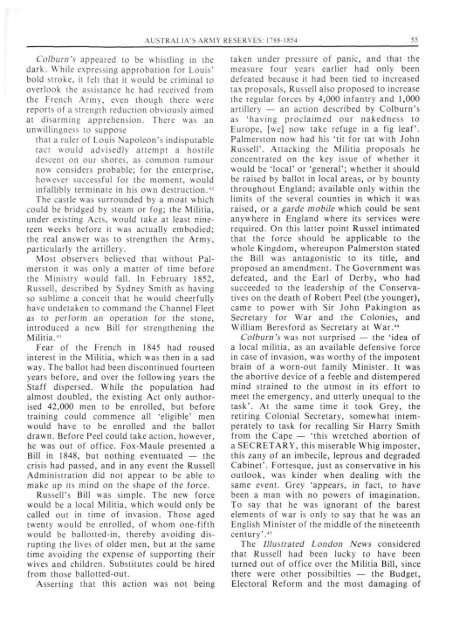ISSUE 34 : May/Jun - 1982 - Australian Defence Force Journal
ISSUE 34 : May/Jun - 1982 - Australian Defence Force Journal
ISSUE 34 : May/Jun - 1982 - Australian Defence Force Journal
Create successful ePaper yourself
Turn your PDF publications into a flip-book with our unique Google optimized e-Paper software.
AUSTRALIA'S ARMY RESERVES: 1788-1854 55<br />
Colbum's appeared to be whistling in the<br />
dark. While expressing approbation for Louis'<br />
bold stroke, it felt that it would be criminal to<br />
overlook the assistance he had received from<br />
the French Army, even though there were<br />
reports of a strength reduction obviously aimed<br />
at disarming apprehension. There was an<br />
unwillingness to suppose<br />
that a ruler of Louis Napoleon's indisputable<br />
tact would advisedly attempt a hostile<br />
descent on our shores, as common rumour<br />
now considers probable; for the enterprise,<br />
however successful for the moment, would<br />
infallibly terminate in his own destruction.^<br />
The castle was surrounded by a moat which<br />
could be bridged by steam or fog; the Militia,<br />
under existing Acts, would take at least nineteen<br />
weeks before it was actually embodied;<br />
the real answer was to strengthen the Army,<br />
particularly the artillery.<br />
Most observers believed that without Palmerston<br />
it was only a matter of time before<br />
the Ministry would fall. In February 1852,<br />
Russell, described by Sydney Smith as having<br />
so sublime a conceit that he would cheerfully<br />
have undetaken to command the Channel Fleet<br />
as to perform an operation for the stone,<br />
introduced a new Bill for strengthening the<br />
Militia.-"<br />
Fear of the French in 1845 had roused<br />
interest in the Militia, which was then in a sad<br />
way. The ballot had been discontinued fourteen<br />
years before, and over the following years the<br />
Staff dispersed. While the population had<br />
almost doubled, the existing Act only authorised<br />
42,000 men to be enrolled, but before<br />
training could commence all 'eligible' men<br />
would have to be enrolled and the ballot<br />
drawn. Before Peel could take action, however,<br />
he was out of office. Fox-Maule presented a<br />
Bill in 1848, but nothing eventuated — the<br />
crisis had passed, and in any event the Russell<br />
Administration did not appear to be able to<br />
make up its mind on the shape of the force.<br />
Russell's Bill was simple. The new force<br />
would be a local Militia, which would only be<br />
called out in time of invasion. Those aged<br />
twenty would be enrolled, of whom one-fifth<br />
would be ballotted-in, thereby avoiding disrupting<br />
the lives of older men, but at the same<br />
time avoiding the expense of supporting their<br />
wives and children. Substitutes could be hired<br />
from those ballotted-out.<br />
Asserting that this action was not being<br />
taken under pressure of panic, and that the<br />
measure four years earlier had only been<br />
defeated because it had been tied to increased<br />
tax proposals, Russell also proposed to increase<br />
the regular forces by 4,000 infantry and 1,000<br />
artillery — an action described by Colburn's<br />
as 'having proclaimed our nakedness to<br />
Europe, [we] now take refuge in a fig leaf.<br />
Palmerston now had his 'tit for tat with John<br />
Russell'. Attacking the Militia proposals he<br />
concentrated on the key issue of whether it<br />
would be 'local' or 'general'; whether it should<br />
be raised by ballot in local areas, or by bounty<br />
throughout England; available only within the<br />
limits of the several counties in which it was<br />
raised, or a garde mobile which could be sent<br />
anywhere in England where its services were<br />
required. On this latter point Russel intimated<br />
that the force should be applicable to the<br />
whole Kingdom, whereupon Palmerston stated<br />
the Bill was antagonistic to its title, and<br />
proposed an amendment. The Government was<br />
defeated, and the Earl of Derby, who had<br />
succeeded to the leadership of the Conservatives<br />
on the death of Robert Peel (the younger),<br />
came to power with Sir John Pakington as<br />
Secretary for War and the Colonies, and<br />
William Beresford as Secretary at War. 44<br />
Colburn's was not surprised — the 'idea of<br />
a local militia, as an available defensive force<br />
in case of invasion, was worthy of the impotent<br />
brain of a worn-out family Minister. It was<br />
the abortive device of a feeble and distempered<br />
mind strained to the utmost in its effort to<br />
meet the emergency, and utterly unequal to the<br />
task'. At the same time it took Grey, the<br />
retiring Colonial Secretary, somewhat intemperately<br />
to task for recalling Sir Harry Smith<br />
from the Cape — 'this wretched abortion of<br />
a SECRETARY, this miserable Whig imposter,<br />
this zany of an imbecile, leprous and degraded<br />
Cabinet'. Fortesque, just as conservative in his<br />
outlook, was kinder when dealing with the<br />
same event. Grey 'appears, in fact, to have<br />
been a man with no powers of imagination.<br />
To say that he was ignorant of the barest<br />
elements of war is only to say that he was an<br />
English Minister of the middle of the nineteenth<br />
century'. 4 '<br />
The Illustrated London News considered<br />
that Russell had been lucky to have been<br />
turned out of office over the Militia Bill, since<br />
there were other possibilties — the Budget,<br />
Electoral Reform and the most damaging of

















